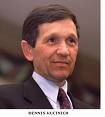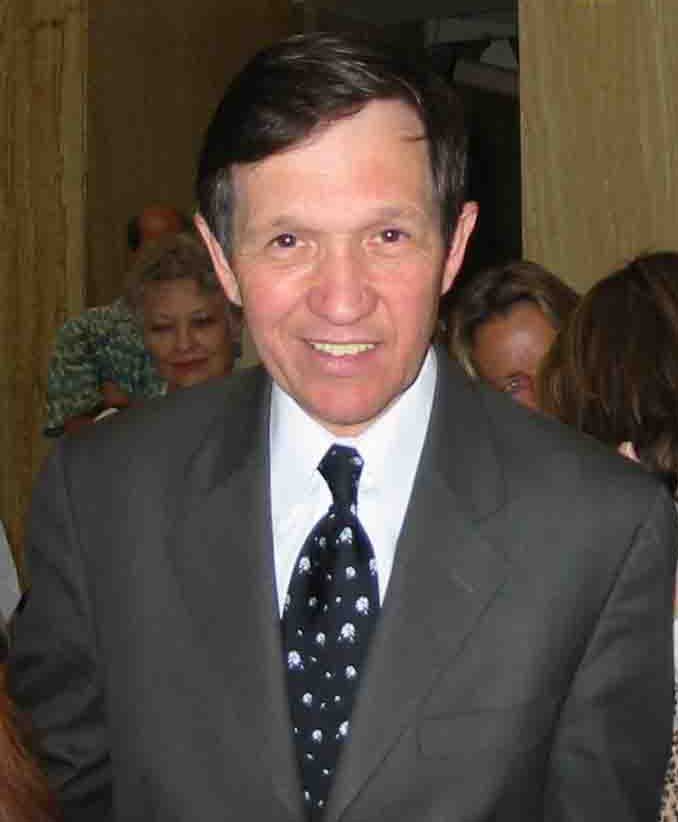“Peace Insurgency”: Rep. Dennis Kucinich Challenges War Criminals in High Office

Unexpectedly, it came upon the vernal equinox, and it was a strategic masterstroke.
Dennis Kucinich’s arrival in London crept up on the global peace movement like a fog settling over the ancient city that resulted in high voltage blasts of white-hot political thunderbolts.
Married to a British woman in 2005, Dennis Kucinich visited his new British family in the quiet surroundings of Upminister and then travelled across London to Parliament Square where he addressed an august assembly of top-ranking peace veterans convened by the Stop the War Coalition, the same people who had assembled one million marchers in Hyde Park on February 15, 2003.
After two striking appearances on the BBC, Kucinich entered Central Hall in doughty Parliament Square situated directly across from the Palace of Westminster, the seat of Parliament and Britain’s ancient democracy.
Under the huge dome of Central Hall, the grand master of British politics, Tony Benn, welcomed the throng of one thousand enthusiastic peace activists. Reminding the crowd that the United Nations had held some of its very first meetings in the same room in 1946, Benn introduced Dennis Kucinich as the shining new star in the global campaign for peace and the undisputed head of the burgeoning American peace movement.
Kucinich was awarded star billing in all the advance publicity for the event titled, “The Peoples Assembly – The Debate Parliament won’t have.” With the limelight shining directly on him as the first speaker in a star-studded line-up that included over fifty members of Parliament, Kucinich delivered a stunning series of statements that pleased, energized and eventually electrified the crowd assembled in Westminster.
Beginning with warm personal remarks, Kucinich introduced his wife, Elizabeth, herself a highly respected global campaigner for human rights. With his newly acquired British cultural credentials firmly established, Kucinich launched into an attack on the propriety, the legality and the morality of the Bush-Blair war in Iraq. Throughout his systematic deconstruction of the legal and moral foundations of the Iraq war, Kucinich delivered a devastating demolition of the neoconservative paradigm and everything it stands for.
Kucinich proclaimed, “We must seek to replace the law of force with the force of law.”
Citing international law, Kucinich went much further than even the eager audience anticipated in his critique of contemporary international relations. Criticizing George Bush, Tony Blair and his rivals: Hillary Clinton, Barack Obama and John Edwards who are vying with him for the Democratic nomination for president, Kucinich pointed out that threatening Iran with military aggression was a direct violation of the UN Charter, a document that had been debated from the same platform he was standing upon that very day.
The crowd went wild with enthusiasm and broke into his speech with thunderous torrents of applause. Kucinich was hailed as the man the world had been waiting for – an American politician with the courage of his convictions who adheres to the canon of international law who would install peace in place of war in the most powerful nation on earth.
Warming to his audience, Kucinich moved into his visionary agenda to restore America, a nation that is known to be lagging far behind so many others in providing the basics to its citizens. Kucinich proposed to “break the shackles of fear” encumbering America and a swift return to constitutional democracy via the immediate repeal of the notorious “Patriot Act.” His presidential prescription included a constellation of universally recognized elements: environmental protection; universal health care; free education from kindergarten through college; withdrawal from NAFTA and the WTO; the displacement of war and the imposition of peace as an official department of the federal government.

Hurrying to catch his plane to Washington, Kucinich was besieged by a trailing wake of admirers and the international press corps. On his way down an exit corridor he was button-holed by television crews from Asia, Europe and the Middle East.
In one fell stroke, Dennis Kucinich emerged from London town with the olive branch and the laurel crown – the shining hope of billions and the only American presidential candidate with any peace credentials worth having.
Peace insurgencies have been very successful in past Democratic presidential campaigns. RFK, Eugene McCarthy, George McGovern, Jimmy Carter, Gary Hart even Paul Tsongas and Bill Clinton could be deemed to have been representatives of peace insurgencies in their days. Howard Dean surged as the anti-war candidate in 2003. In 2007, Kucinich is now poised and perfectly positioned for a surge forward in the American presidential contest.
Kucinich’s strategic positioning comes at a time when Hillary Clinton and Barack Obama are bashing one another over the war issue. Every scintilla of momentum stripped from those campaigns will accrue to Kucinich’s building head of steam for a potential surge of political momentum.
With the latest tragic developments striking the campaign of John Edwards and the SEIU healthcare forum in Nevada this weekend, this campaign is finally on the brink of becoming interesting.



